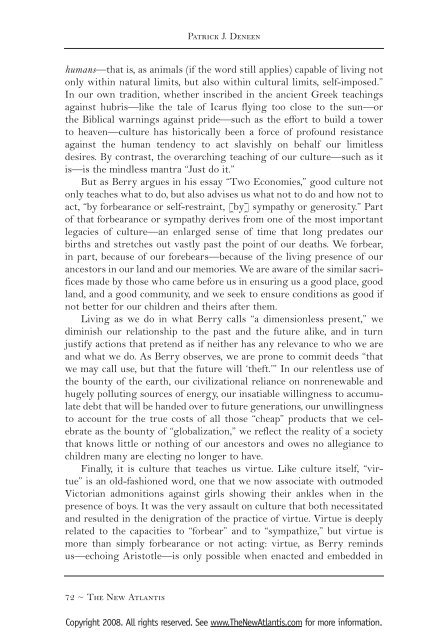Technology, Culture, and Virtue Patrick J. Deneen - The New Atlantis
Technology, Culture, and Virtue Patrick J. Deneen - The New Atlantis
Technology, Culture, and Virtue Patrick J. Deneen - The New Atlantis
You also want an ePaper? Increase the reach of your titles
YUMPU automatically turns print PDFs into web optimized ePapers that Google loves.
<strong>Patrick</strong> J. <strong>Deneen</strong>humans—that is, as animals (if the word still applies) capable of living notonly within natural limits, but also within cultural limits, self-imposed.”In our own tradition, whether inscribed in the ancient Greek teachingsagainst hubris—like the tale of Icarus flying too close to the sun—orthe Biblical warnings against pride—such as the effort to build a towerto heaven—culture has historically been a force of profound resistanceagainst the human tendency to act slavishly on behalf our limitlessdesires. By contrast, the overarching teaching of our culture—such as itis—is the mindless mantra “Just do it.”But as Berry argues in his essay “Two Economies,” good culture notonly teaches what to do, but also advises us what not to do <strong>and</strong> how not toact, “by forbearance or self-restraint, [by] sympathy or generosity.” Partof that forbearance or sympathy derives from one of the most importantlegacies of culture—an enlarged sense of time that long predates ourbirths <strong>and</strong> stretches out vastly past the point of our deaths. We forbear,in part, because of our forebears—because of the living presence of ourancestors in our l<strong>and</strong> <strong>and</strong> our memories. We are aware of the similar sacrificesmade by those who came before us in ensuring us a good place, goodl<strong>and</strong>, <strong>and</strong> a good community, <strong>and</strong> we seek to ensure conditions as good ifnot better for our children <strong>and</strong> theirs after them.Living as we do in what Berry calls “a dimensionless present,” wediminish our relationship to the past <strong>and</strong> the future alike, <strong>and</strong> in turnjustify actions that pretend as if neither has any relevance to who we are<strong>and</strong> what we do. As Berry observes, we are prone to commit deeds “thatwe may call use, but that the future will ‘theft.’” In our relentless use ofthe bounty of the earth, our civilizational reliance on nonrenewable <strong>and</strong>hugely polluting sources of energy, our insatiable willingness to accumulatedebt that will be h<strong>and</strong>ed over to future generations, our unwillingnessto account for the true costs of all those “cheap” products that we celebrateas the bounty of “globalization,” we reflect the reality of a societythat knows little or nothing of our ancestors <strong>and</strong> owes no allegiance tochildren many are electing no longer to have.Finally, it is culture that teaches us virtue. Like culture itself, “virtue”is an old-fashioned word, one that we now associate with outmodedVictorian admonitions against girls showing their ankles when in thepresence of boys. It was the very assault on culture that both necessitated<strong>and</strong> resulted in the denigration of the practice of virtue. <strong>Virtue</strong> is deeplyrelated to the capacities to “forbear” <strong>and</strong> to “sympathize,” but virtue ismore than simply forbearance or not acting: virtue, as Berry remindsus—echoing Aristotle—is only possible when enacted <strong>and</strong> embedded in72 ~ <strong>The</strong> <strong>New</strong> <strong>Atlantis</strong>Copyright 2008. All rights reserved. See www.<strong>The</strong><strong>New</strong><strong>Atlantis</strong>.com for more information.











